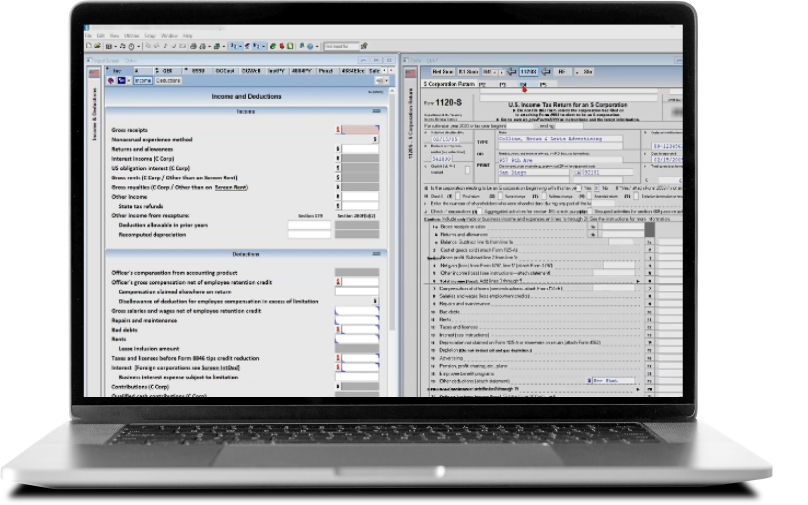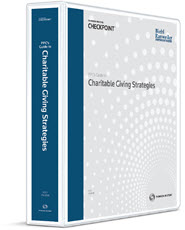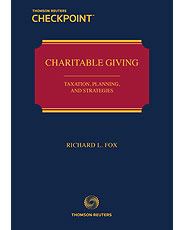FAQ on how charitable giving affects taxes.
Highlights
- Charitable contributions to qualified organizations may be deductible when itemizing deductions on Schedule A.
- Donation limits typically allow deductions up to 60% of Adjusted Gross Income for cash donations.
- Starting in 2026, you can either itemize your charitable contribution deductions or take a limited above-the-line deduction if you claim the standard deduction.
Giving generously to causes we support not only enriches our communities, but it can also come with potential tax benefits. Understanding the intricacies of charitable contribution deductions is critical for accountants when it comes to advising clients on the best ways to support their chosen philanthropic causes, while optimizing overall tax strategy.
In the U.S., the IRS provides specific guidelines on what constitutes a valid charitable contribution and how these contributions can impact an individual’s tax liabilities. Let’s take a detailed look at charitable giving strategies that can maximize tax benefits for both individuals and businesses.
Jump to ↓
Are charitable donations tax deductible?
How do charitable donations affect taxes?
What donations are tax deductible?
IRS rules for charitable contributions
How much do charitable donations reduce taxes?
How much can you donate to charity without itemizing?
When is the deadline for charitable contributions for taxes?
Helping clients with charitable contribution deductions on their tax return
Are charitable donations tax deductible?
Yes. Charitable contributions to qualified organizations may be deductible if you itemize deductions on Schedule A (Form 1040), Itemized Deductions. Starting in 2026, you can claim an above-the-line deduction for certain cash contributions even if you don’t itemize. Your deduction, however, is limited to $1,000 if you’re a single filer ($2,000 if you’re a joint filer). To see if the organization you have contributed to qualifies as a charitable organization for income tax deductions, use Tax Exempt Organization Search.
Taxpayers who make donations to qualifying charitable organizations can often deduct the value of their contributions from their taxable income, thereby reducing their overall tax burden. However, it’s important to note that not all donations are eligible for tax deductions. To determine if your charitable contributions are tax deductible, use the IRS Interactive Tax Assistant.
Understanding the ins and outs of charitable contribution deductions is crucial for accountants as they guide individuals and businesses in taking full advantage of the tax benefits associated with charitable giving.
How do charitable donations affect taxes?
Charitable donations can have a significant impact on your taxes, potentially reducing your taxable income and overall tax liability. Here’s a look at how charitable donations typically affect taxes:
Tax deductions
When you make a donation to a qualified charitable organization, you may be eligible to deduct the donation amount from your taxable income, effectively reducing the amount of income subject to taxation. This can lead to a lower overall tax bill.
Itemized deductions
To claim a deduction for charitable donations given in 2025, you need to itemize your deductions on your tax return, which means detailing all deductible expenses, including charitable contributions, medical expenses, mortgage interest, and state and local taxes. If your total itemized deductions exceed the standard deduction amount for your filing status, you may benefit from itemizing. Starting in 2026, you can either itemize your charitable contribution deductions or take a limited above-the-line deduction if you claim the standard deduction.
Limits on deductions
There are limits on the amount of charitable contributions you can deduct. Typically, you can deduct up to 60% of your Adjusted Gross Income (AGI) for cash donations to public charities and certain private foundations. Other limits may apply depending on the type of organization and the nature of the donation. Also, starting in 2026, a new 0.5% AGI floor applies to itemizers, meaning the first 0.5% of AGI in charitable contributions is not deductible.
Non-cash donations
Donating non-cash items, such as clothing, furniture, or other goods, can also lead to tax deductions. However, the deduction is generally based on the fair market value of the donated items at the time of donation.
Recordkeeping
It’s essential to keep detailed records of all charitable contributions, including receipts, acknowledgments from the charitable organizations, and any written communications related to the donations. Proper documentation is necessary to support your deduction claims in case of an IRS audit.
Appreciated assets
Donating appreciated assets, such as stocks or real estate, can provide additional tax benefits. In such cases, you may be able to avoid capital gains tax on the appreciation while also claiming a charitable deduction for the fair market value of the donated asset.
It’s important to understand the specific rules and regulations surrounding charitable donations and tax deductions, as they can vary based on your client’s individual circumstances and the type of organization they are donating to. For a comprehensive overview from the U.S. Chamber of Commerce, see How Do Charitable Donations Impact Your Taxes?
What donations are tax deductible?
The IRS outlines specific guidelines for donations that are eligible for tax deductions. Generally, donations to qualifying charitable organizations are tax deductible. These can include:
- Cash donations: Contributions made in the form of cash, checks, electronic funds transfers, or credit card payments are usually deductible. It’s essential to maintain proper documentation, such as bank records, receipts, or written communication from the charity, to substantiate these contributions.
- Property donations: Donations of tangible property, such as clothing, household goods, vehicles, and real estate, to qualifying organizations may also be eligible for tax deductions. However, the IRS has specific rules regarding the valuation and reporting of these non-cash contributions.
- Securities and appreciated assets: Donating appreciated stocks, bonds, or mutual fund shares to charitable organizations can be advantageous for both the donor and the recipient. Such donations often allow the donor to claim a deduction for the fair market value of the asset, while also potentially avoiding capital gains tax on the appreciated value of the asset.
It’s important to note that contributions to individuals, political organizations, and certain private foundations may not be eligible for tax deductions. Additionally, the IRS may have specific requirements for documentation and substantiation, especially for non-cash contributions, so it’s crucial to maintain proper records and follow the IRS guidelines to ensure the eligibility of the donations for tax deductions.
IRS rules for charitable contributions
Generally, you can only deduct charitable contributions if you itemize deductions on Schedule A (Form 1040), Itemized Deductions. However, starting in 2026, you can claim an above-the-line deduction for certain cash contributions even if you don’t itemize (limited to $1,000 if you’re a single filer or $2,000 if you’re a joint filer). Gifts to individuals are not deductible and only qualified organizations are eligible to receive tax deductible contributions.
If you receive a benefit in exchange for the contribution such as merchandise, goods or services, including admission to a charity ball, banquet, theatrical performance, or sporting event, you can only deduct the amount that exceeds the fair market value of the benefit received or expected to be received.
For contributions of cash, check, or other monetary gift (regardless of amount), you must maintain a record of the contribution: a bank record or a written communication from the qualified organization containing the name of the organization, the amount, and the date of the contribution.
To determine if the organization that you contributed to qualifies as a charitable organization for income tax deduction purposes, refer to the Tax Exempt Organization Search Tool.
Forms for charitable donations
For any contribution of $250 or more (including contributions of cash or property), you must obtain and keep in your records a contemporaneous written acknowledgment from the qualified organization indicating the amount of the cash and a description of any property other than cash contributed. The acknowledgment must say whether the organization provided any goods or services in exchange for the gift and, if so, must provide a description and a good faith estimate of the value of those goods or services. One document from the qualified organization may satisfy both the written communication requirement for monetary gifts and the contemporaneous written acknowledgment requirement for all contributions of $250 or more.
You must fill out one or more of Form 8283, Noncash Charitable Contributions and attach them to your return, if your deduction for each noncash contribution is more than $500. If you claim a deduction of more than $500, but not more than $5,000 per item (or a group of similar items), you must fill out Form 8283, Section A. If you claim a deduction of more than $5,000 per item (or a group of similar items), you must obtain a qualified appraisal of the item or group of items and fill out Form 8283, Section B. If you claim a deduction of more than $500,000 for a contribution of noncash property, you must fill out Form 8283, Section B, and also attach the qualified appraisal to your return.
Special rules apply to donations of certain types of property such as automobiles, inventory and certain other readily valued property. For more information, refer to Publication 526.
How much do charitable donations reduce taxes?
Typically, you can claim deductions of up to 60% of your Adjusted Gross Income (AGI) through charitable donations. However, this percentage may be restricted to 20%, 30%, or 50% depending on the nature of the contribution and the specific organization.
This limitation applies universally to all donations within a given year, regardless of the number of organizations you contribute to. If your contributions surpass the set limit, you can often account for them in your tax returns over the next five years, or until the excess amount is fully utilized, through a procedure known as carryover.
Also, for 2026 and beyond, a new 0.5% AGI floor applies to itemizers, meaning the first 0.5% of AGI in charitable contributions is not deductible. Any amount disallowed by the floor is generally a permanent loss unless the taxpayer exceeds the AGI ceiling and generates a carryover.
You can either opt for the standard deduction or choose to itemize on your tax return. The standard deduction operates as a fixed, guaranteed amount that you can subtract from your Adjusted Gross Income (AGI) without providing evidence to the IRS. Itemized deductions work in a different manner, allowing you to lower your taxable income by claiming individual expenses recognized by the IRS.
Itemized deductions include specific expenses such as property taxes, certain unreimbursed medical costs, or business mileage. If you decide to take the standard deduction, you won’t be able to deduct home mortgage interest or access certain types of tax benefits. If you itemize, it’s important to retain records that support your deductions in case of an IRS audit.
How do charity tax deductions work?
To claim a charity tax deduction on your taxes, you must have contributed money or goods to a tax-exempt organization, received nothing in return for your gift, and then itemize the donation on your tax return by filing Schedule A (Form 1040). Starting in 2026, you can either itemize your charitable contribution deductions or take a limited above-the-line deduction if you claim the standard deduction.
If you plan to claim itemized deductions for charitable contributions on your tax return, the deduction limit is 60% of your Adjusted Gross Income (AGI). The exact percentage you can claim is determined by the type of contribution you make.
However, if your standard deduction is more than the sum of your itemized deductions, it might be worth taking the standard deduction instead.
How much can you donate to charity without itemizing?
To benefit from itemizing deductions, the total amount of your deductible expenses, including charitable contributions, should exceed the standard deduction for your filing status. For 2025, the standard deduction amounts are as follows:
- Single: $15,750
- Head of Household: $23,625
- Married Filing Jointly: $31,500
If the total amount of your charitable contributions for the tax year is significant and, when combined with other itemizable deductions (such as mortgage interest, state and local taxes, and medical expenses), exceeds the standard deduction, it may be worthwhile to itemize.
It is important to note that itemizing requires detailed record-keeping of your charitable donations, including receipts or acknowledgments from the charitable organizations. Make sure you have proper documentation to support your claims.
If you’re in a higher tax bracket, each dollar of deduction may provide a greater tax benefit. However, if your deductions are only slightly above the standard deduction, it may not significantly reduce your tax liability.
Often, taking the standard deduction simplifies your tax return and may save you time and effort compared to itemizing, which can involve more paperwork and calculations.
When is the deadline for charitable contributions for taxes?
To be tax deductible, charitable contributions must be made and paid in cash or property before the end of your tax year, which for most is December 31. Be sure to advise your clients on planning year-end strategies to help them maximize their tax benefits.
Helping clients with charitable contribution deductions on their tax return
Providing comprehensive guidance to clients on how to claim charitable contribution deductions on their tax returns is a fundamental responsibility for accountants. This involves ensuring accurate documentation of contributions, adherence to IRS regulations, and effective communication with clients to optimize their tax benefits.
Tax software can be a valuable tool for accountants to guide their clients on charitable giving tax strategies. Here’s how:
Deduction optimization: Tax software can help accountants analyze the client’s financial information and make recommendations on the best strategy for maximizing deductions. It can calculate whether it’s more beneficial for the client to itemize deductions or take the standard deduction based on their specific financial situation and charitable giving.
Real-time updates: Tax software provides real-time updates on changes to tax laws and regulations. This ensures that accountants are aware of any adjustments that may impact their clients’ charitable giving strategies. You can then advise clients accordingly, taking advantage of any new deductions or credits related to charitable contributions.
Comprehensive reporting: Tax software can generate detailed reports on the client’s charitable contributions, making it easier for you to track and analyze their giving patterns over time. These reports can help identify trends and optimize future charitable giving strategies to maximize tax benefits.
Scenario analysis: Accountants can use tax software to run various scenarios to determine the impact of different charitable giving strategies on their clients’ tax liabilities. This allows you to provide clients with a clear understanding of the potential tax benefits associated with different levels and types of charitable contributions.
Compliance assurance: Tax software often comes equipped with features that help ensure compliance with IRS regulations. You can use these features to verify that your clients’ charitable contributions meet the necessary requirements for tax deductions, thus reducing the risk of audit and potential penalties.
From staying up to date on new IRS regulations to advising your clients on the best ways to support the causes that are important to them, tax software is essential in providing sound financial advice and ensuring strategic philanthropy for individuals and businesses alike.
By leveraging the capabilities of Thomson Reuters UltraTax CS, you can be confident in your ability to guide clients on the best charitable giving tax strategies, while optimizing your firm’s tax planning and preparation workflow.

UltraTax CS
Professional tax preparation software to reduce your workflow time and increase your productivity
Learn more ↗








